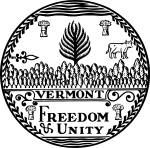1830 Vermont gubernatorial election
| |||||||||||||||||||||
| |||||||||||||||||||||
 County results Crafts: 40–50% 50–60% Palmer: 50–60% 70–80% Meech: 30–40% 40–50% | |||||||||||||||||||||
| |||||||||||||||||||||
| Elections in Vermont |
|---|
 |
The 1830 Vermont gubernatorial election took place in September and October, and resulted in the election of Samuel C. Crafts to a one-year term as governor.[1]
In the mid-1820s, the Democratic-Republicans, the only major party following the demise of the Federalists after the War of 1812, began to splinter into supporters and opponents of President Andrew Jackson.[2] The opponents of Jackson were called National Republicans, and adopted the name Whig after the 1832 presidential election.[2] The pro-Jackson party was still referred to as the Democratic-Republican Party, but adopted the name Democratic Party prior to the 1832 elections.[2] The Anti-Masonic Party, which formed in the late 1820s, continued to gather supporters, and had more influence in Vermont than in most other states.[3]
The Vermont General Assembly met in Montpelier on October 14.[1] The Vermont House of Representatives appointed a committee to review the votes of the freemen of Vermont for governor, lieutenant governor, treasurer, and members of the governor's council.[1] The committee determined that no candidate had won a majority for governor or lieutenant governor.[1] In accordance with the Vermont Constitution, the General Assembly was required to choose.[1]
The popular vote for governor was reported as: Total votes, 30,721; Samuel C. Crafts (National Republican), 13,476 (43.9%); William A. Palmer (Anti-Masonic),[4] 10,923 (35.6%); Ezra Meech (Democratic-Republican), 6,285 (20.4%); scattering, 37 (0.01%).[1]
In the election for lieutenant governor, the popular vote totals were: Total votes, 29,847; Mark Richards (National Republican), 12,779 (42.8%); Lebbeus Egerton (Anti-Masonic),[4] 10,594 (35.5%); John Roberts (Democratic-Republican), 6,405 (21.4%); scattering, 69 (0.02%).[1] After numerous ballots over several days failed to produce winners, on Tuesday, October 19 the General Assembly chose Crafts for governor and Richards for lieutenant governor.[1]
With 224 legislators and councilors casting votes for governor on the 32nd ballot, 113 were required for a majority.[5] Crafts received 115, Palmer received 72, and Democratic-Republican William Czar Bradley received 37.[5] For lieutenant governor, 211 members of the General Assembly voted on the third ballot, so 106 were necessary for victory.[5] Richards received 117, Egerton received 57, and Roberts 37.[5]
Benjamin Swan won election to a one-year term as treasurer, his thirty-first.[1] Though he had nominally been a Federalist, Swan was usually endorsed by the Democratic-Republicans and even after the demise of the Federalist Party he was frequently unopposed.[6] In 1830, he was endorsed by the National Republicans[7] and Democratic-Republicans,[8] and opposed by Anti-Masonic candidate Augustine Clarke.[4] In the treasurer's race, the popular vote was reported as: Total votes cast, 28,917; Swan, 18,544 (64.1%); Clarke, 10,325 (35.7%); scattering, 48 (0.02%).[9]
Results
[edit]| Party | Candidate | Votes | % | ±% | |
|---|---|---|---|---|---|
| National Republican | Samuel C. Crafts (incumbent) | 13,476 | 43.9% | ||
| Anti-Masonic | William A. Palmer | 10,923 | 35.6% | ||
| Democratic-Republican | Ezra Meech | 6,285 | 20.4% | ||
| Scattering | 37 | 0.1% | |||
| Total votes | 30,721 | 100% | |||
References
[edit]- ^ a b c d e f g h i Walton, E. P., ed. (1879). Records of the Governor and Council of the State of Vermont. Vol. VII. Montpelier, VT: J. & J. M. Poland. pp. 392–395 – via Google Books.
- ^ a b c Fox, Dorus Morton (1895). History of Political Parties, National Reminiscences, and the Tippecanoe Movement. Des Moines, IA: Iowa Printing Co. pp. 36–38 – via Google Books.
- ^ "Antimasonry". Freedom and Unity: Building Communities 1820-1860. Montpelier, VT: Vermont Historical Society. 2006. Retrieved April 24, 2021.
- ^ a b c "Anti-Masonic Republican Ticket". Middlebury Free Press. Middlebury, VT. September 2, 1830. p. 2 – via Newspapers.com.
- ^ a b c d "Vermont Legislature: Tuesday, October 19". Vermont Aurora. Vergennes, VT. October 28, 1830. p. 2 – via Newspapers.com.
- ^ Joshua L. (November 26, 2004). "Swan, Benjamin". Our Campaigns. Our Campaigns.com. Retrieved March 21, 2021.
- ^ "National Republican Nomination". The Horn of the Green Mountains. Manchester, VT. August 3, 1830. p. 2 – via newspapers.com.
- ^ "Republican Ticket". Vermont Gazette. Bennington, VT. July 20, 1830. p. 1 – via Newspapers.com.
- ^ "Legislature of Vermont: For Treasurer". The Herald. St. Johnsbury, VT. October 20, 1830. p. 3 – via Newspapers.com.



